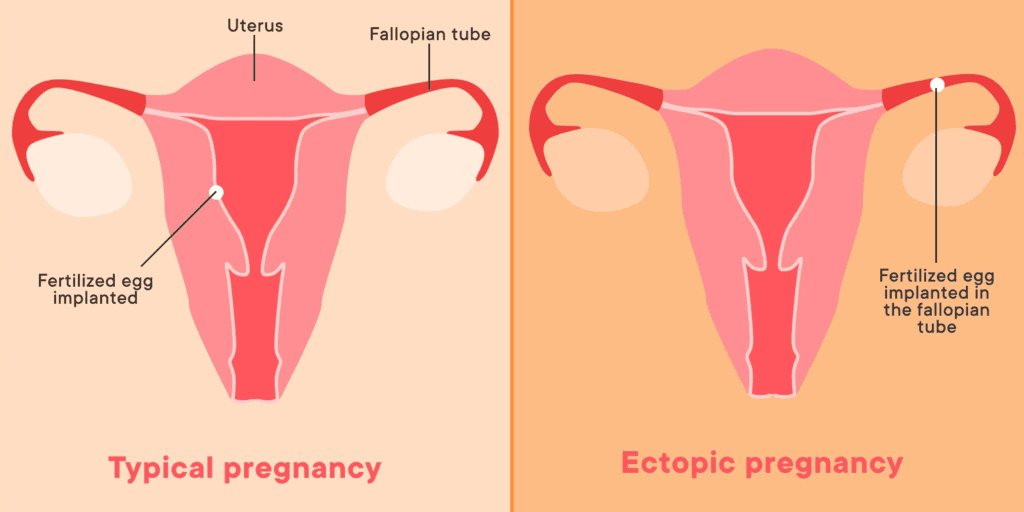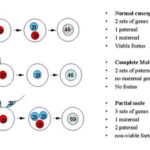
The uterus, ovaries, and fallopian tubes are all parts of a woman’s reproductive system. In a normal pregnancy, the ovary releases an egg into the fallopian tube. If the egg meets with a sperm, the fertilized egg moves into the uterus, attaches to its lining and continues to grow for the next nine months.
In an ectopic pregnancy (or a tubal pregnancy), the fertilized egg stays in your fallopian tube instead of moving to the uterus. Ectopic simply means “out of place.” In rare cases, the fertilized egg attaches to one of your ovaries or another organ in your abdomen. In even rarer cases, the embryo attaches to that part of the fallopian tube that penetrates the muscular layer of the uterus, outside of the uterine cavity. It is called interstitial or cornual pregnancy.

Ectopic Pregnancy Statistics
Ectopic pregnancy happens in up to 1 of every 50 pregnancies, and if not treated immediately, it may seriously endanger your life or your fertility.
Most often, ectopic pregnancy happens within the first few weeks of pregnancy. It is usually discovered by the 8th week of pregnancy. You might not even know you’re pregnant yet, so it can come as a shock, especially as some women with an ectopic pregnancy continue to menstruate. If, however, you take a pregnancy test, the result will usually be positive, though a negative result is possible as well (the urine test may show up as negative for a few weeks or appear to be faint).
Ectopic pregnancy can be a shocking and scary experience. Instead of going through the routine check-ups, you will undergo emergency treatment and the baby cannot survive. However, you should know that you’ll still likely be able to enjoy a healthy pregnancy in the not-so-far future.
But for now, your health and safety come first. If an ectopic pregnancy isn’t recognized and treated in time, the growth of the embryo will cause the fallopian tube to rupture, resulting in severe abdominal pain and bleeding. This can cause permanent damage to the tube or loss of the tube. If the rupture involves very heavy internal bleeding that’s not treated immediately, it can even lead to death. That’s why it’s extremely important to diagnose ectopic pregnancies in time and provide immediate medical treatment.
Symptoms for Ectopic Pregnancy
- Light vaginal bleeding
- Nausea and vomiting
- Pain in the lower abdomen
- Sharp cramps in the abdomen
- Pain on one side of the body
- Pain in the shoulder, neck, or rectum
- Weakness or dizziness
In case the fallopian tube ruptures, the pain and bleeding could be severe enough to cause lightheadedness, fainting and shock.
If you are experiencing the symptoms listed above, contact your health care provider immediately and go to the ER. Getting to the hospital as quickly as possible is important to reduce the risk of severe bleeding and to preserve your fertility.
Causes of Ectopic Pregnancy
- History of previous ectopic pregnancies
- History of pelvic surgery (scarring may block the fallopian tube and prevent the fertilized egg from progressing to your uterus)
- A damaged fallopian tube that doesn’t let a fertilized egg into your uterus, so it implants in the tube or somewhere else.
- Infertility treatments such as IVF
- Use of an intrauterine device (IUD), a form of a contraceptive, that is inserted at the time of conception
- History of pelvic inflammatory disease (PID) inflammation of the fallopian tube (salpingitis) or an infection of the uterus, fallopian tubes or ovaries. Those are often caused by sexually-transmitted diseases such as chlamydia and gonorrhea.
- Unsuccessful tubal ligation (having your tubes tied) or tubal ligation reversal
- Use of fertility drugs
Diagnosis of Ectopic Pregnancy
While there are some risk factors, an ectopic pregnancy can happen to anyone. And, because it might endanger you, it’s crucial to recognize symptoms as early as possible and get medical treatment right away.
At the hospital, a pregnancy test, a pelvic exam, and an ultrasound test may be performed to view the condition of the uterus and the fallopian tubes.
Treatment of Ectopic Pregnancy
- If an ectopic pregnancy diagnosed early enough and the tube is not ruptured, a medicine called methotrexate may be used to stop the growth of pregnancy tissue. The medication stops the growth of the embryo cells. It is usually only suitable if the egg is no larger than 3.5 cm in diameter.
Methotrexate may not be used if you have one or more of the following conditions:
A medical condition known to weaken the immune system, such as diabetes.
A type of blood disorder that causes low levels of certain types of blood cells, such as anemia.
Liver disease
Kidney disease
- If the fallopian tube has not ruptured and the pregnancy has not progressed very far, laparoscopic surgery may be prescribed. A laparoscope, which is a thin, flexible instrument, will be inserted through small incisions in your abdomen. A tiny incision will be made in your fallopian tube and the embryo will be removed, preserving the integrity of the fallopian tube.
- If the doctor suspects that the fallopian tube has ruptured, emergency surgery will be necessary to stop the bleeding. If the fallopian tube and ovary were damaged, they will have to be removed.
After the treatment, you will usually have to undergo additional blood tests that detect the hCG level to make sure that the pregnancy was removed entirely.
Pregnancy after Ectopic Pregnancy
Most women who had an ectopic pregnancy have normal pregnancies in the future, even if they had a fallopian tube removed. You should have no difficulties to get pregnant as long as you have one healthy fallopian tube. Some doctors suggest waiting 3 to 6 months before trying to conceive again, so consult your doctor regarding how long you should wait after an ectopic pregnancy.
Related: Pregnancy Options and Chances After Tubal Ligation






